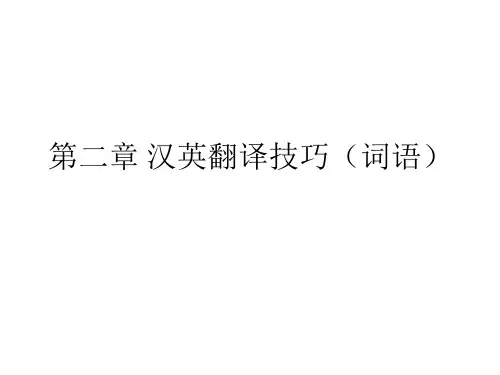第二章 汉英翻译基础知识.
- 格式:ppt
- 大小:2.86 MB
- 文档页数:79
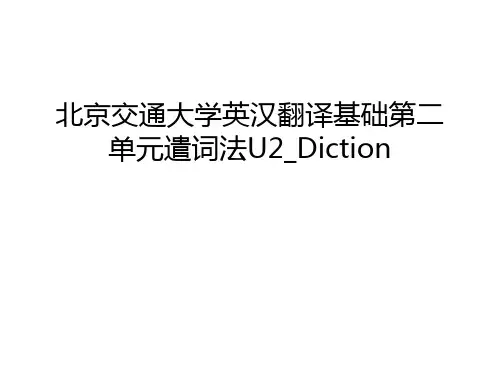
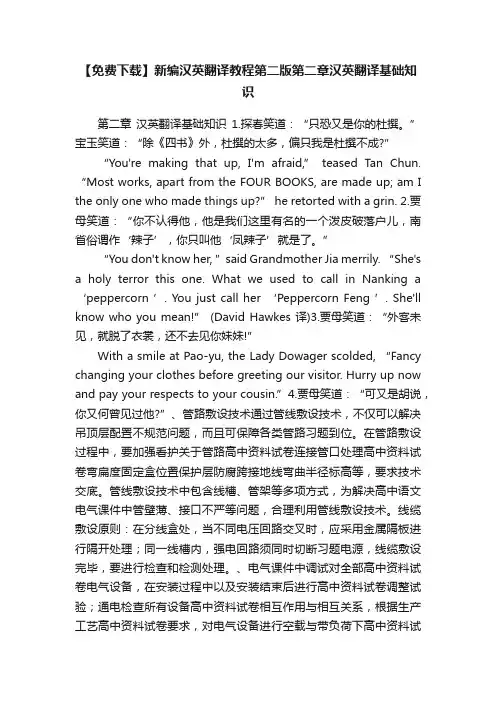
【免费下载】新编汉英翻译教程第二版第二章汉英翻译基础知识第二章汉英翻译基础知识1.探春笑道:“只恐又是你的杜撰。
”宝玉笑道:“除《四书》外,杜撰的太多,偏只我是杜撰不成?”“You're making that up, I'm afraid,” teased Tan Chun. “Most works, apart from the FOUR BOOKS, are made up; am I the only one who made things up?” he retorted with a grin. 2.贾母笑道:“你不认得他,他是我们这里有名的一个泼皮破落户儿,南省俗谓作‘辣子’,你只叫他‘凤辣子’就是了。
”“You don't know her, ”said Grandmother Jia merrily. “She's a holy terror this one. What we used to call in Nanking a ‘peppercorn ’. You just call her ‘Peppercorn Feng ’. She'll know who you mean!” (David Hawkes 译)3.贾母笑道:“外客未见,就脱了衣裳,还不去见你妹妹!”With a smile at Pao-yu, the Lady Dowager scolded, “Fancy changing your clothes before greeting our visitor. Hurry up now and pay your re spects to your cousin.”4.贾母笑道:“可又是胡说,你又何曾见过他?”、管路敷设技术通过管线敷设技术,不仅可以解决吊顶层配置不规范问题,而且可保障各类管路习题到位。
在管路敷设过程中,要加强看护关于管路高中资料试卷连接管口处理高中资料试卷弯扁度固定盒位置保护层防腐跨接地线弯曲半径标高等,要求技术交底。
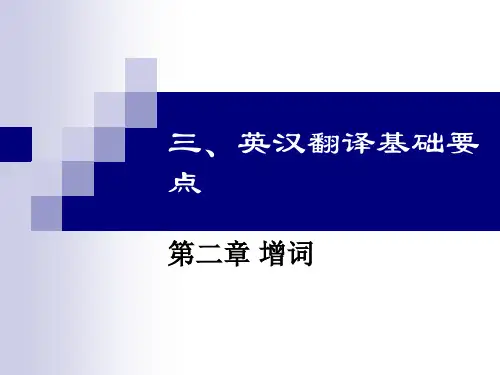
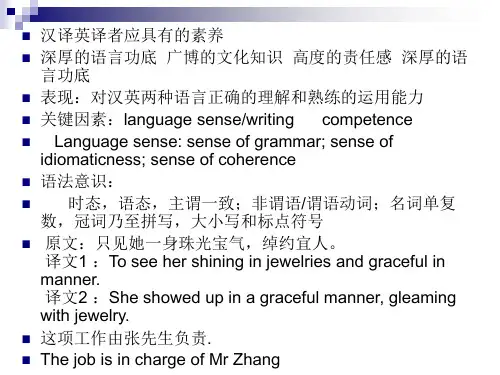
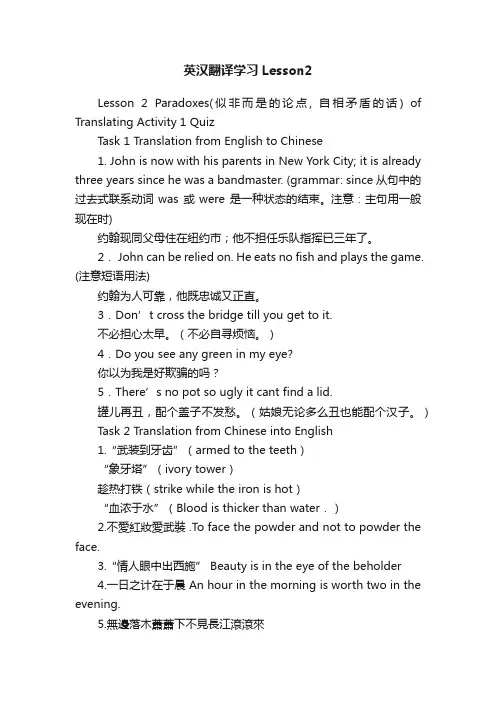
英汉翻译学习Lesson2Lesson 2 Paradoxes(似非而是的论点, 自相矛盾的话) of Translating Activity 1 QuizTask 1 Translation from English to Chinese1. John is now with his parents in New York City; it is already three years since he was a bandmaster. (grammar: since从句中的过去式联系动词was 或were 是一种状态的结束。
注意:主句用一般现在时)约翰现同父母住在纽约市;他不担任乐队指挥已三年了。
2. John can be relied on. He eats no fish and plays the game. (注意短语用法)约翰为人可靠,他既忠诚又正直。
3.Don’t cross the bridge till you get to it.不必担心太早。
(不必自寻烦恼。
)4.Do you see any green in my eye?你以为我是好欺骗的吗?5.There’s no pot so ugly it cant find a lid.罐儿再丑,配个盖子不发愁。
(姑娘无论多么丑也能配个汉子。
)Task 2 Translation from Chinese into English1.“武装到牙齿”(armed to the teeth)“象牙塔”(ivory tower)趁热打铁(strike while the iron is hot)“血浓于水”(Blood is thicker than water.)2.不愛紅妝愛武裝 .To face the powder and not to powder the face.3.“情人眼中出西施” Beauty is in the eye of the beholder4.一日之计在于晨 An hour in the morning is worth two in the evening.5.無邊落木蕭蕭下不見長江滾滾來The boundless forest sheds its leaves shower by showerThe endless rivers rolls its waves hour after hourActivity 2 Questions1. Could you write down the difficulties that you have come across when doing translation? (5mins)2. The following 4 questions are mainly based on Eugene A. Nida (1993). Please think over the questions below and write down your understandings.(1)Translating is a complex and fascinating task. In fact, some scholarshave claimed that it is probably the most complex type of event in the history of the cosmos(宇宙). And yet, translating is so natural and easy that children seem to have no difficulty in interpreting for their immigrant parents. These children normally do very well until they have gone to school and have learned about nouns, verbs, and adverbs. Why?Answer:Because they then try to match the words and grammar rather than the content.(2)Most people assume(vt.假定, 设想, 采取, 呈现) that literalness(n.文字的, 表面意义上的, 无修饰的) in translating means faithfulnessto the text. Because of the many discrepancies (n.相差, 差异, 矛盾)between meanings and structures of different languages, some people have insisted that translating is impossible. What do you think?Answer: Those who insist that translating is impossible are usually concerned with some of the more marginal(adj.记在页边的, 边缘的, 边际的) features of figurative (adj.比喻的, 修饰丰富的, 形容多的) language and complex poetic structures. The use offigurativelanguage is universal(adj.普遍的, 全体的, 通用的, 宇宙的, 世界的), but the precise figures of speech in one language rarely match those in another. Yet translating is simply doing the impossible well. In fact, though some famous authors insist that translating is impossible, they do not hesitate to have their own writingtranslated.(3)What do you think of the view that paraphrase(explanation) shouldbe avoided in translating?Answer: In fact, all translating involves different degrees of paraphrase, since there is no way in which one can successfully translate word for word and structure for structure. For example, the Chinese saying 他下海了is literally “He went down to the sea”, but is more appropriately translated as “He became a businessman”.Since languages do not differ essentially in what they can say, but in how they say it, paraphrase is inevitable. What is important is the semantic(语义的) legitimacy (n.合法(性), 正统(性), 正确(性), 合理(性)) of the paraphrase.(4)There is a widespread( adj.分布广泛的, 普遍的) view that atranslator should first produce a more or less literalrendering(translating) of the source text(source text源程序正文) and then proceed to improve it stylistically(adv.在文体上). Do you agree?Answer: Style is not the frosting on the cake(蛋糕上的糖霜), but an integral part(integral part主要的部分)of the text right from the beginning. It must bebuilt into the text right from the beginning. It is usually better to aim first at a stylistically satisfactory rendering of the source text and then review it carefully to “tighten it up” by analyzing and testing the correspondences(n.相应, 通信, 信件). A few errors in the correspondences of lexical meaning are much more excusable (adj.可原谅的, 可容许的, 言之有理的, 可免除的)than missing the spirit and aesthetic (adj.美学的, 审美的, 有审美感的)character of the source text.(Now how did you feel after going through the above 4 questions? You might feel a bit disappointed for there seems to be noth ing particularly exotic and exciting in Nida’s saying. At the same time, you might alsofeel a bit confused, for the above 4 questions do not present a very clear and well-organized picture of translation. Well, do not worry too much at this stage. In the rest of the book, we shall take a closer look at the nature and the procedures of translation. Our focus, however, will be on introducing some useful translation skills and on practicing translating ourselves. We shall also spend some time examining those language points on which English and Chinese differ, hence are difficult to deal with in translation. One such point is presented in Activity 3 below.) Activity 3 Language Differ: Differences in LexiconsSince translation theories and skills are both built upon the differences and similarities between the source language and the target language, in each chapter of this course, we shall examine one or two language points on which English and Chinese differ. First of all, Chinese and English show a lot of discrepancies in their lexicons, especially in word meanings and word combinations.Task 1 Words sharing the same designative(指定的)andassociative (adj. 联想的)meaningsSome English words and their Chinese counterparts share exactly the same designative and associative meanings. These are mainly some proper names, technical terms and the names of some everyday objects.Can you give their Chinese equivalents?The U.S. State Department 美国国务院Cognitive linguistics 认知语言学The Indian Ocean 印度洋AIDS 艾滋病Helicopter 直升飞机Skyscraper 摩天大楼Now please list 5 English examples and their Chinese counterparts and 5 Chinese examples and their English counterparts in the space provided below. Discuss with your partner if all the examples you list indeed share the same meanings and the same connotations(内涵)with their counterparts in the target language.List AList BTask 2 Words Not Sharing the Same MeaningsWhen you were thinking of your own examples for Task 1, you might already notice that many English words and their seeming (adj.表面上的)Chinese counterparts do not really share exactly the same meanings or connotations.(1) Is the following translation version provided the only possible one?If not, can you offer other versions?Brother哥弟Mother-in-law岳母婆婆Grandparents祖父母外祖父母Aunt姑姨、婶、Uncle叔伯、舅(2) Now can you think of your own English and Chinese examples? If yes, please write them down in the space provided below. You may have a brainstorming (自由讨论,智力爆发)with your partners if you happen to get stuck on your own.Task 3 English Words with More Than One MeaningAs learners of English, we are familiar with the fact that most English words have more than one meaning depending on different context. When translating into Chinese, these different meanings are usually matched with different Chinese words rather than with one Chinese word.A. To take “hard” as an example, can you translate the following phrases into Chinese?1.hard rocks 坚硬的岩石2.a hard blue 一种刺目(眼)的蓝色3.hard drugs 烈性毒品4.hard sounds 清音5.hard currency 硬通货6.hard water 水质较硬的水7.hard evidence 确凿的证据(铁证)8.a hard winter 一个严寒的冬天(严冬)9.hard times 艰难岁月10.hard on somebody 对某人很严厉11.a hard smile (一个)冷酷的微笑12.think hard 认真地思考13.hard work 辛苦的工作14.a hard question (一个)难回答的问题B. Loo k at the meanings of ‘man’1.man and his wife 丈夫和妻子2.officers and men 官和兵3.his man Friday 他的仆人礼拜五(丹尼尔·笛福《鲁滨逊漂流记》)4.man-of-war 军舰5.Be a man! 要像个男子汉﹗C. sophisticated1.sophisticated man 老于世故的人2.sophisticated woman 狡黠的女子3.sophisticated columnist 老练的专栏作家,资深专栏作家4.sophisticated electronic device 高度精密的电子装置5.sophisticated weapon 尖端武器D. run1.run to seed 花谢结子—不修边幅—丧失活力—破旧不堪2.run the streets 流浪街头3.run a hare 追捕野兔—追捕坐车不买票的人4.run one’s eyes down a list匆匆看一下单子5.run one’s head into a wall撞南墙;碰壁6.the machine runs well 机器运转良好7.the river runs east 河水流向东方(大江东流去)8.the news runs rapidly in the town 这个消息迅速在镇上传开Task 4 Chinese Words with More Than One Meaning You might already be saying to yourselves “Well, English is not alone in giving one word many different meanings. Chinese is even more extreme in this respec t.” You are certainly justified (v.证明...是正当的)in thinking that way.To take a very simple word下as an example. Can you translate the following into English?1.下班 get off work/ knock off2.下半辈子the later half of one’s life3.下策 an unwise decision/ a stupid move 4.下厨房 go to the kitchen (to prepare a meal) 5.下蛋 lay eggs6.下饭 go well with rice7.下岗 go off sentry(卫兵,岗哨) duty 8.下课 finish class/ the class is over 9.下列 listed below10.下坡路 a downhill path11.下棋 play chess12.下属 subordinate13.下乡 go to the countryside14.下旬 the last ten-day period of a month 15.下意识 sub-consciousnessTask 5 Co-occurrence with Other Words:Many English words and their Chinese counterparts also show a lot of differences in their combinations with other words. To take “play” as an example, to play basketball is 打篮球, to play football is踢足球 , and to play the piano is弹钢琴 .Now please try to translate the following sentences into Chinese, paying special attention to the italicized parts.1.He wore a pair of dark glasses and a thick grey overcoat.他戴一副墨镜,穿一件厚厚的灰外套。
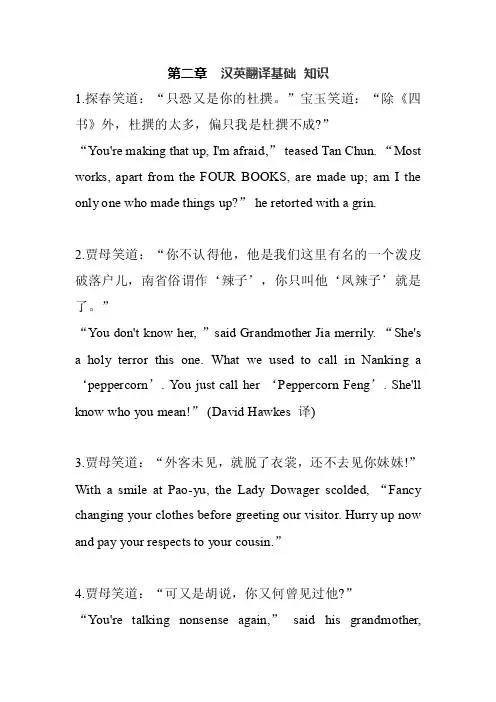
第二章汉英翻译基础知识1.探春笑道:“只恐又是你的杜撰。
”宝玉笑道:“除《四书》外,杜撰的太多,偏只我是杜撰不成?”“You're makingthat up, I'm afraid,” teasedTan Chun. “Most works, apart from the FOUR BOOKS, are made up; am I the only one who made thingsup?” he retorte d with a grin.2.贾母笑道:“你不认得他,他是我们这里有名的一个泼皮破落户儿,南省俗谓作‘辣子’,你只叫他‘凤辣子’就是了。
”“You don't know her, ”said Grandmo ther Jia merrily. “She's a holy terrorthis one. What we used to call in Nanking a ‘pepperc orn’. You just call her ‘Pepperc orn Feng’. She'll know who you mean!” (David Hawkes译)3.贾母笑道:“外客未见,就脱了衣裳,还不去见你妹妹!”With a smile at Pao-yu, the Lady Dowager scolded, “Fancy changin g your clothes beforegreetin g our visitor. Hurry up now and pay your respect s to your cousin.”4.贾母笑道:“可又是胡说,你又何曾见过他?”“You're talking nonsens e again,”said his grandmo ther,laughin g. “How could you possibl y have met her?”5.他是只狡猾的老狐狸。
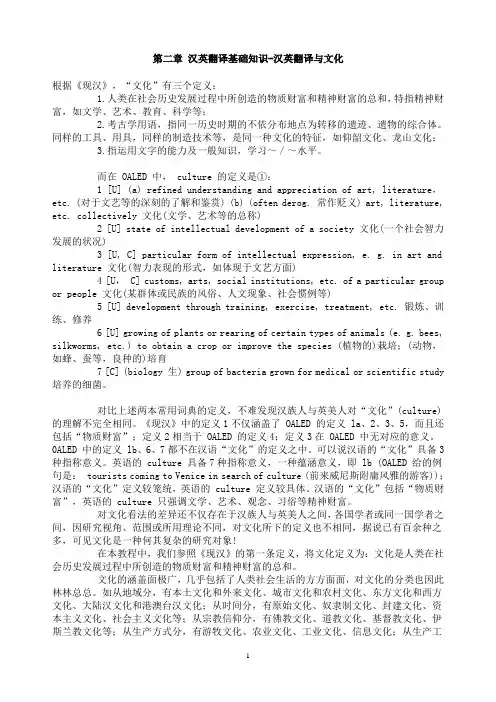
第二章汉英翻译基础知识-汉英翻译与文化根据《现汉》,“文化”有三个定义:1.人类在社会历史发展过程中所创造的物质财富和精神财富的总和,特指精神财富,如文学、艺术、教育、科学等;2.考古学用语,指同一历史时期的不依分布地点为转移的遗迹、遗物的综合体。
同样的工具、用具,同样的制造技术等,是同一种文化的特征,如仰韶文化、龙山文化;3.指运用文字的能力及一般知识,学习~/~水平。
而在 OALED 中, culture 的定义是①:1 [U] (a) refined understanding and appreciation of art, literature,etc. (对于文艺等的深刻的了解和鉴赏) (b) (often derog. 常作贬义) art, literature, etc. collectively 文化(文学、艺术等的总称)2 [U] state of intellectual development of a society 文化(一个社会智力发展的状况)3 [U, C] particular form of intellectual expression, e. g. in art and literature 文化(智力表现的形式,如体现于文艺方面)4 [U, C] customs, arts, social institutions, etc. of a particular group or people 文化(某群体或民族的风俗、人文现象、社会惯例等)5 [U] development through training, exercise, treatment, etc. 锻炼、训练、修养6 [U] growing of plants or rearing of certain types of animals (e. g. bees, silkworms, etc.) to obtain a crop or improve the species (植物的)栽培;(动物,如蜂、蚕等,良种的)培育7 [C] (biology 生) group of bacteria grown for medical or scientific study 培养的细菌。
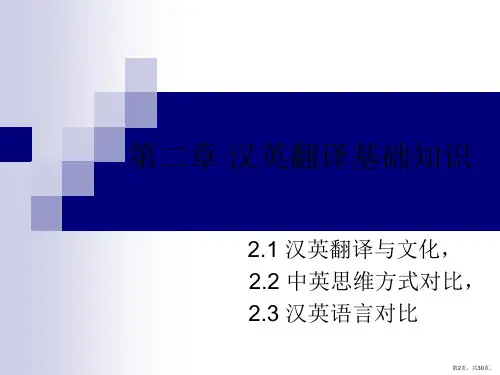
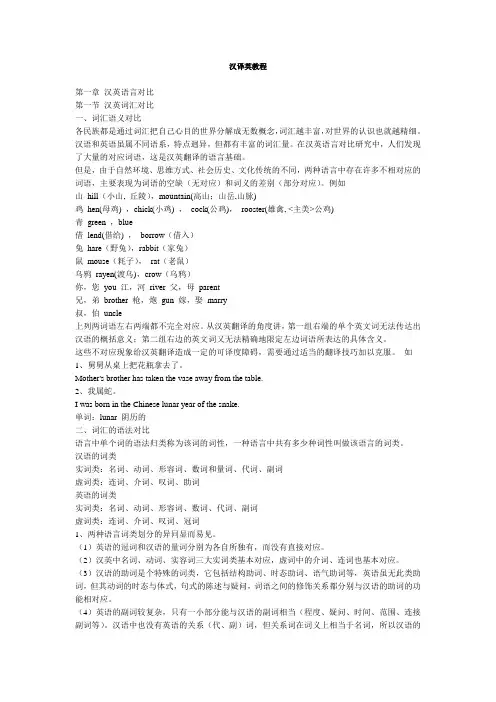
汉译英教程第一章汉英语言对比第一节汉英词汇对比一、词汇语义对比各民族都是通过词汇把自己心目的世界分解成无数概念,词汇越丰富,对世界的认识也就越精细。
汉语和英语虽属不同语系,特点迥异,但都有丰富的词汇量。
在汉英语言对比研究中,人们发现了大量的对应词语,这是汉英翻译的语言基础。
但是,由于自然环境、思维方式、社会历史、文化传统的不同,两种语言中存在许多不相对应的词语,主要表现为词语的空缺(无对应)和词义的差别(部分对应)。
例如山hill(小山, 丘陵),mountain(高山;山岳,山脉)鸡hen(母鸡) ,chick(小鸡) ,cock(公鸡),rooster(雄禽, <主美>公鸡)青green ,blue借lend(借给) ,borrow(借入)兔hare(野兔),rabbit(家兔)鼠mouse(耗子),rat(老鼠)乌鸦rayen(渡乌),crow(乌鸦)你,您you 江,河river 父,母parent兄,弟brother 枪,炮gun 嫁,娶marry叔,伯uncle上列两词语左右两端都不完全对应。
从汉英翻译的角度讲,第一组右端的单个英文词无法传达出汉语的概括意义;第二组右边的英文词又无法精确地限定左边词语所表达的具体含义。
这些不对应现象给汉英翻译造成一定的可译度障碍,需要通过适当的翻译技巧加以克服。
如1、舅舅从桌上把花瓶拿去了。
Mother's brother has taken the vase away from the table.2、我属蛇。
I was born in the Chinese lunar year of the snake.单词:lunar 阴历的二、词汇的语法对比语言中单个词的语法归类称为该词的词性,一种语言中共有多少种词性叫做该语言的词类。
汉语的词类实词类:名词、动词、形容词、数词和量词、代词、副词虚词类:连词、介词、叹词、助词英语的词类实词类:名词、动词、形容词、数词、代词、副词虚词类:连词、介词、叹词、冠词1、两种语言词类划分的异同显而易见。
